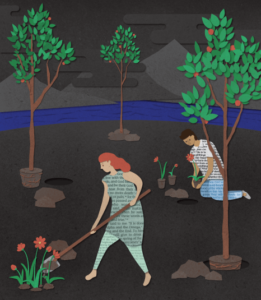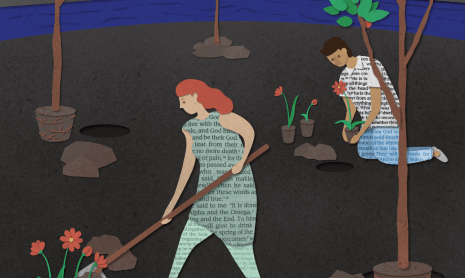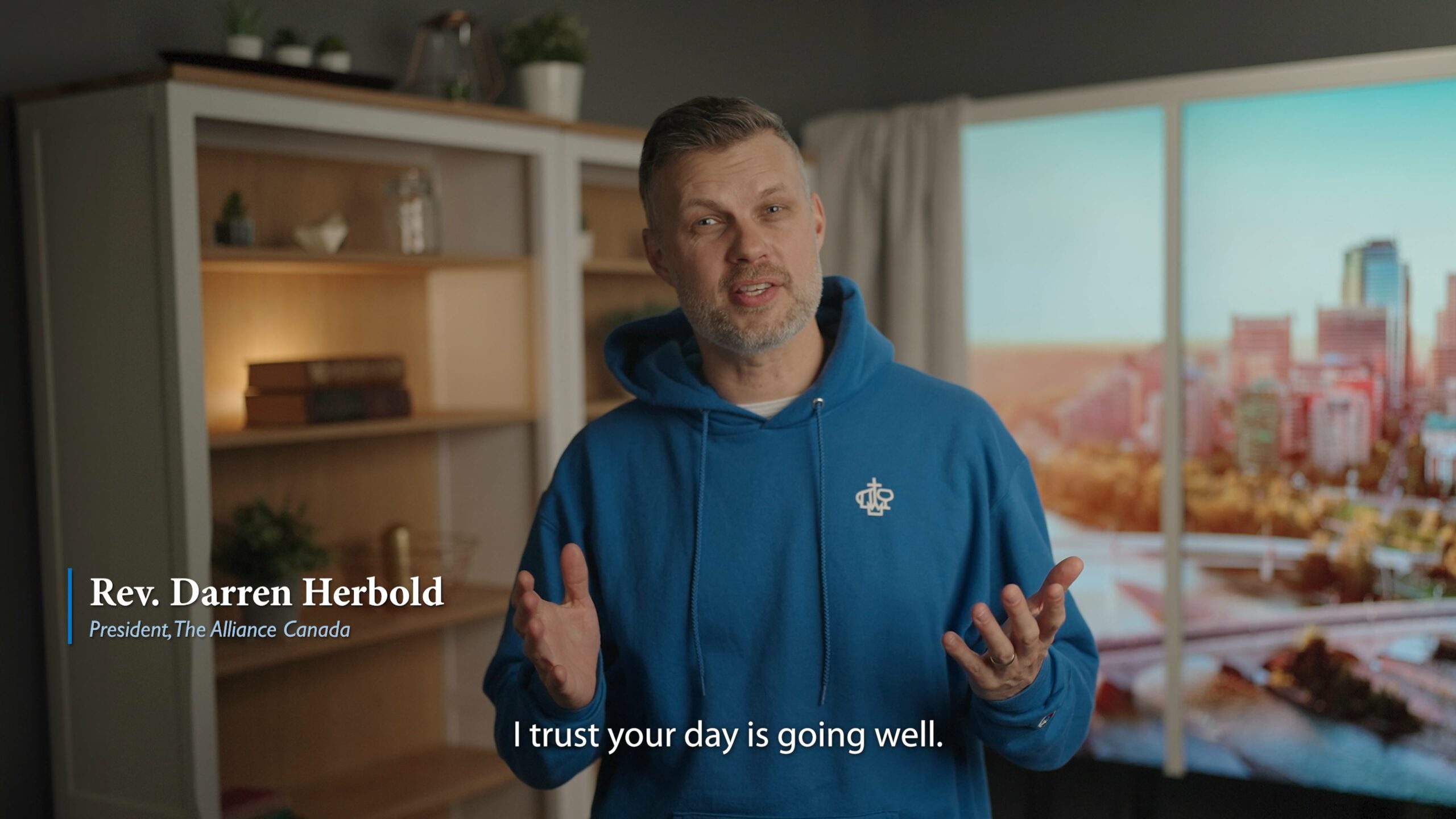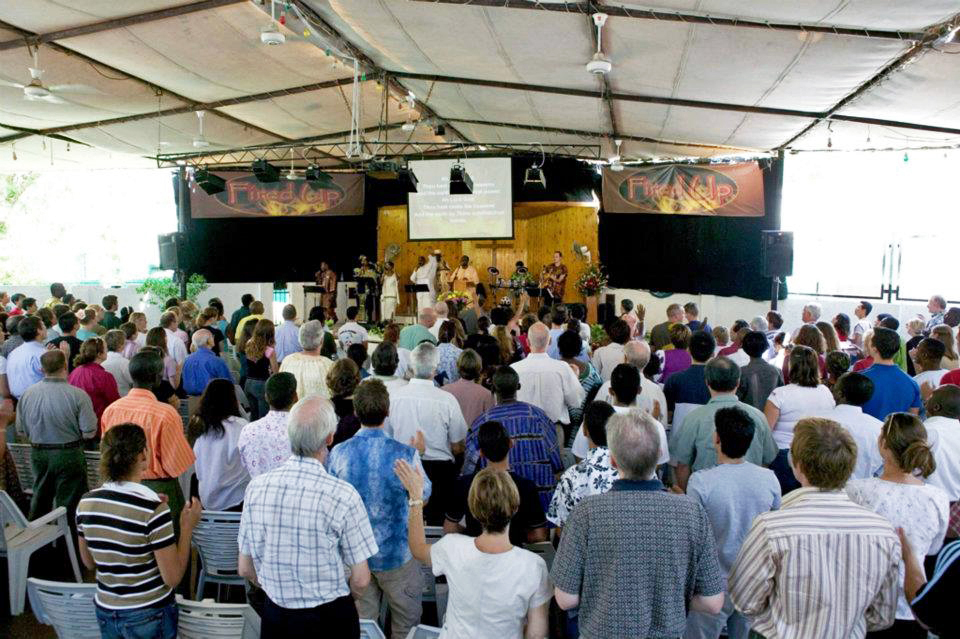Church leaders at a conference in an East African nation were discussing the fact that, while approximately 80% of their population claim to be Christian, their country is still rife with issues: corruption at multiple levels, tribal conflicts, domestic abuse, extreme poverty, gender inequality, garbage strewn everywhere, environmental degradation, HIV/AIDS, and more. After reflecting on this, they concluded, “the missionaries brought us too small of a Gospel!” A gospel message that focused primarily on spiritual things and a future hope of Heaven after we leave this world was not complete.
Evangelicals have traditionally taught a gospel message that started with the problem—that all sinners are separated from God. Jesus’ death and resurrection provides salvation, and if we place our trust in Him, we will go to Heaven. Our discipleship focused on reading the Bible and prayer in order to live a morally holy life.
While these components are important to understanding personal salvation, it is not the complete message of the redeeming work of Christ. The complete gospel message must include the entire narrative of Scripture. The Good News must start in Genesis—with the creation story; the place where we encounter how God intended for His entire creation to function prior to the impact of sin in the world.
The garden narrative describes a place of complete harmony, reciprocal res pect, and an intimacy in relationship between God and humans, between male and female, and humankind with the rest of creation. The Garden was a place of peace in a space where all physical and relational needs were met. A place where humans, created in the image of God, were given the mandate to work with God to nurture wellness and wholeness for all of creation. Dare we call this the first commission?!
pect, and an intimacy in relationship between God and humans, between male and female, and humankind with the rest of creation. The Garden was a place of peace in a space where all physical and relational needs were met. A place where humans, created in the image of God, were given the mandate to work with God to nurture wellness and wholeness for all of creation. Dare we call this the first commission?!
Genesis 3 outlines how the impact of original sin brought disharmony to all the relationships that existed in the Garden. The rest of Scripture tells the narrative of God’s actions to redeem what original sin broke, leading to the life, ministry, death, and resurrection of Jesus which will ultimately culminate in Christ’s return to earth to make all things new (Revelation 21).
The Apostle Paul clearly teaches this as well. He presents the cosmic Christ, “God was pleased to have all his fullness dwell in … and through him to reconcile to himself all things, whether things on earth or things in heaven, by making peace through his blood, shed on the cross” (Colossians 1:20, emphasis added).
The Greek word for reconcile is apokatallassō, which means to bring back to its original state of harmony, and making peace, eirēnopoieō, which means to establish harmony.1
What a message of hope—that Christ is reconciling all things—all the relationships that are in disharmony; He wants to bring them back to the place of shalom demonstrated in the Garden of Eden.
When Jesus sent out the twelve, and then the seventy-two, to carry on His ministry (Luke 9, 10), He told them to first find the person of peace in a community. A person who wanted relational harmony, health, and wholeness for the community. They were then to announce that the “Kingdom of God has come near.” Their ministries included physical and spiritual healing. Everything Jesus taught His followers involved living countercultural to the way of the world; seeking first His Kingdom—in other words, seeking the reign of Christ here and now.
Luke follows these stories in his Gospel with the parable of the Good Samaritan. The teacher of the law asks how to inherit eternal life. Jesus prompts the teacher to give the answer that he needs to love God and his neighbor as expressed through the Good Samaritan principle: caring for justice and physical needs of people—even strangers—at personal cost, risk, and inconvenience.
As the church seeks to continue the ministry of Christ, we need to cast out structural spirits of injustice and oppression. We must address broken worldviews that are part of cultural or religious systems that are antithetical to God’s ways.
A Gospel that truly reflects the Good News of Christ’s redeeming work will do so much more than address the hope of an afterlife in Heaven. Embodying the Gospel is about bringing the Kingdom of God near; it is reflecting the reign of Christ within communities which nurtures wholeness and well-being in every area of life.
When relationships are functioning as God intended, people will not be held in bondage to injustice, poverty, and oppression.
When humankind is taking seriously the mandate to steward and care for creation, communities will flourish because when the land suffers, the rest of creation suffers; when the land thrives, people thrive.2
When the church works to ensure that communities have sustainable food sources, we communicate that in God’s economy there is food for all so that no one goes hungry.
When our international workers—working in cultures that are oppressive of women—empower women and girls through education, we introduce the truth that women also have dignity and value.
This is the Gospel in its fullness that the world so desperately needs to hear about; a transforming faith that impacts every aspect of our lives and relationships. Every act that seeks to bring justice, healing, dignity, sustainability, and wholeness are foretastes of God’s Kingdom which Jesus will establish in its fullness when He returns. As we seek to live out a Gospel that is Christ-centred, Spirit-empowered, and Mission-focused, O God, help us to embrace a fuller Gospel that seeks the reconciliation of all things.
1 James Strong. Strong’s Concordance. 1890.
2Hosea 4:1-3
Share:
Find more posts about:
joanne.beach
Support the mission
The Global Advance Fund (GAF) is a pooled fund that supports our workers in Canada and around the world to share the Gospel with people who haven't yet heard the name of Jesus. Your continued generosity equips and sustains our workers and their ministry.









wow! I am re-reading Genesis now (because it is one of my favourite books in the Bible) and I seem to read it with new lenses each time. That is such a good read and such a good reminder that the garden was/is the perfect example and that it wasn’t just man that was affected in the fall.
I like the lens you provide here. Thank you so much.
Donnette